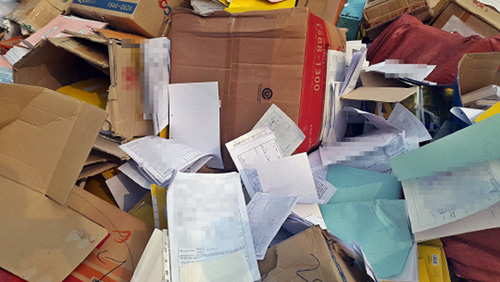No technical protection as digital document…Detailed guideline in urgent
Lee Gyung Tak | kt87@ | 2017-09-25 10:35:28

Paper documents containing personal information to be sent to an abolition station in Seoul.
Lack of paper personal information document
IT has been introduced as a neural network in society and industries, and a massive hacking incident has occurred in financial institutions and online malls, raising awareness of `digital security`. However, experts point out that paper document security is nothing more than a blind spot. It is increasingly voiced that it needs to improve the vague government policies and systems, to provide detailed guidelines, and to monitor the situation and monitor the site properly.
According to Korea Internet Promotion Agency on September 24, the utilization rate of electronic documents in domestic private sector is 57.3%. The electronic document market is expected to grow at an annual average rate of 8% from KRW 3.38 billion in 2015 to KRW 4.97 billion in 2020. Paper documents, however, are still being used by corporations and public institutions as important information recording platforms. However, the management and destruction of paper documents are done based on a similar distribution channel regardless of the size of the organization. The Ministry of Public Administration and Security enacted the Personal Information Protection Act, which was enacted in 2011, stipulates that "in the event of destroying personal information, it should be prevented from being restored or regenerated". The destruction methods and procedures set out in the Presidential Decree are only one line: "records, printed materials, written, and other recording media: shredding or incineration." While regulations are so simple, the destruction of the three stages of shredding company → abolition paper → Papermaking Company is not working properly. Corporations and public institutions leave paper documents that are no longer hard to keep to shredding specialists. These shredders are handed over to the abandoned warehouses run by local companies in the state without properly handling the shipment received from customers, and these companies are finally processed and sold to paper manufacturers who need recycled paper.
Meanwhile, some waste paper collection and management companies are equipped with crushing machines for crushing paper, but for companies, the less damage the paper has, the higher the price from paper companies. Skipping places are common. Companies and public institutions that request to destroy paper documents do not engage in the process of the process.
An expert from the abolition processing industry pointed out, “Paper documents containing detailed information about internal confidentiality and personal information produced by corporations and public institutions are handled like ordinary trash. This is not happening at some problem sites. Even with a little wind, paper documents are flying around and outsiders can take it easily. In the case of the Military Mutual Aid Society, which has secured business rights in the public works, the Military Mutual Aid Society is not properly audited and there are cases in which various public organizations receive paper documents and sell them without proper shredding."
On the other hand, industry expert say that it is virtually impossible to thoroughly dismantle shredding companies in the face of a shrinking market, where public institutions, which can be considered as the largest demand for paper documents, cannot afford to pay for them. An expert in the industry said, "In the past, some public institutions handled several tens of tons of money, but they could not sell or sell it anymore. In some cases, they received money from a shredder company.” He also said, “We have to deal with documents roughly in order to secure profits, rather than shredding." Experts point out that supply and demand for paper are not going to disappear in the near future, so it is urgent to establish systematic standards and procedures for facilities and equipment to handle them.
Kwon Hun-young, a professor at the Korea Information Security Graduate School of Information Security (member of the Korea Information Security Forum), stated, "It is also important that it is included in the law when the privacy information law has been enacted at the time of enactment of the Privacy Act" Professor Kwon said, "Online information is relatively well protected compared to paper documents. Paper documents are managed without any procedure. Paper documents are information that is printed electronically, It is necessary to develop a detailed guideline to manage it."
By Lee Gyung Tak kt87@
